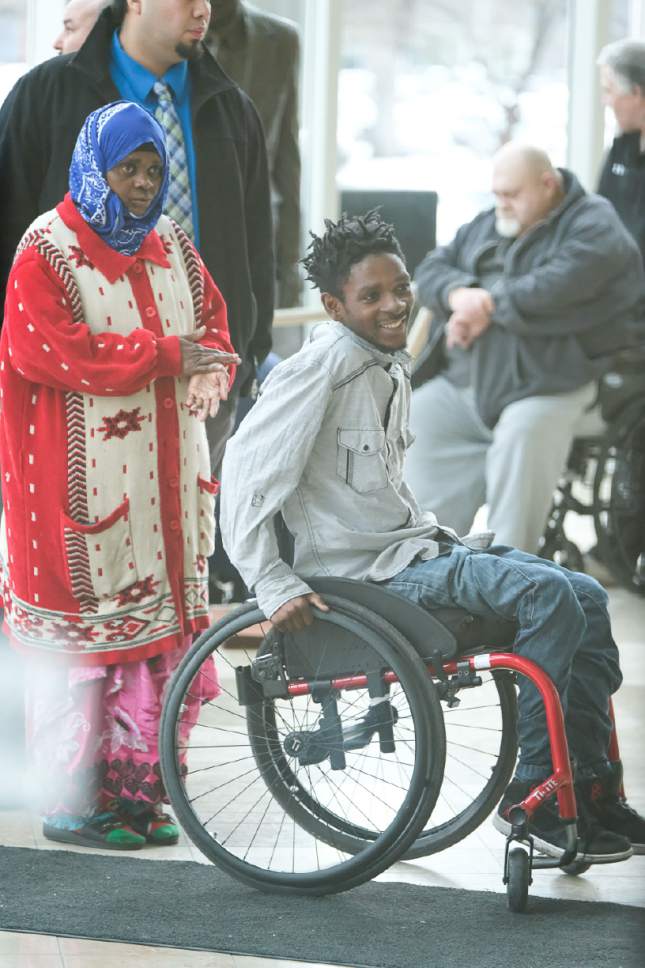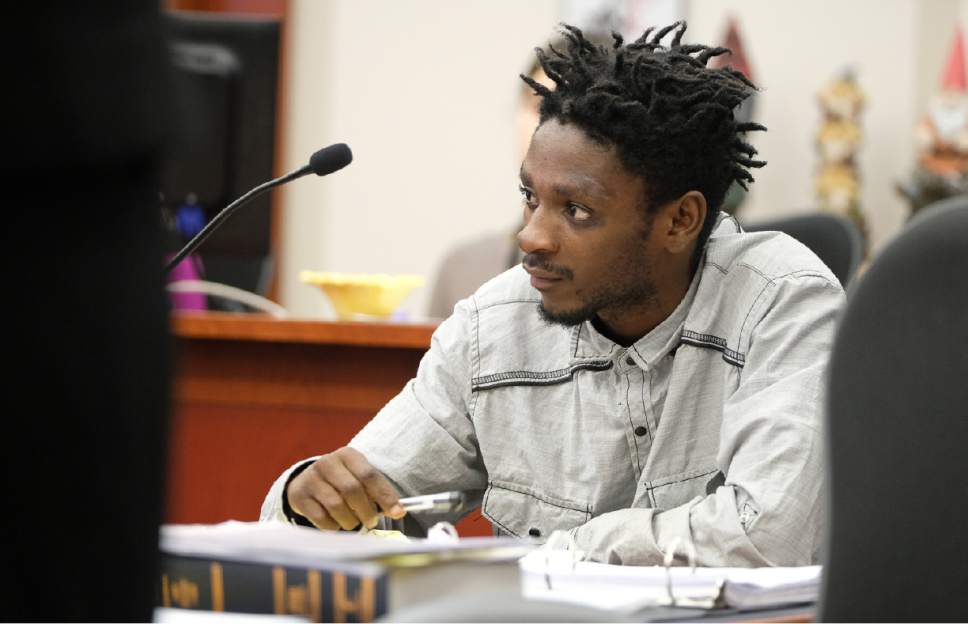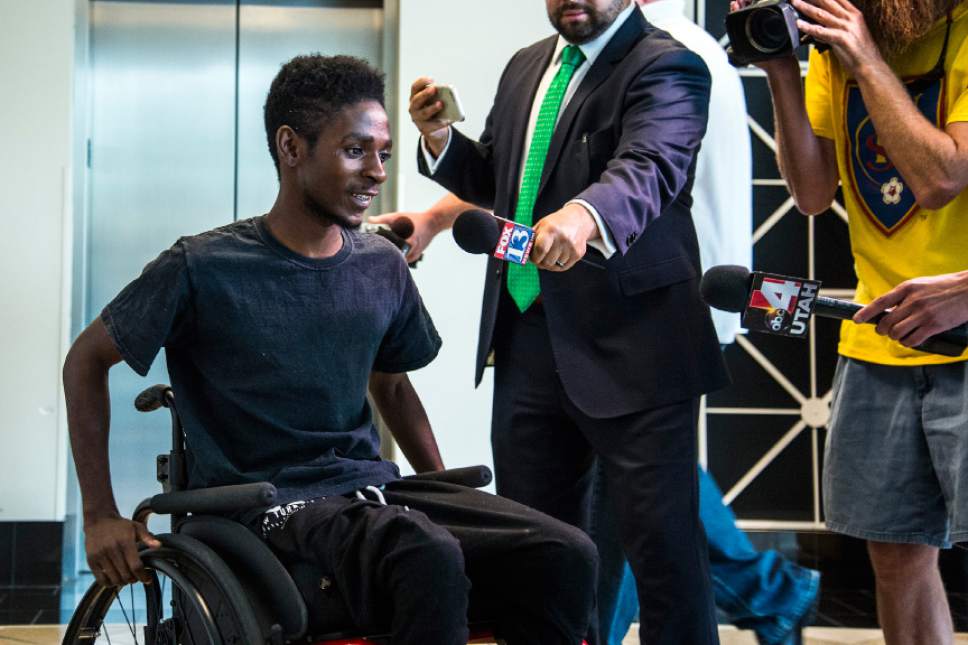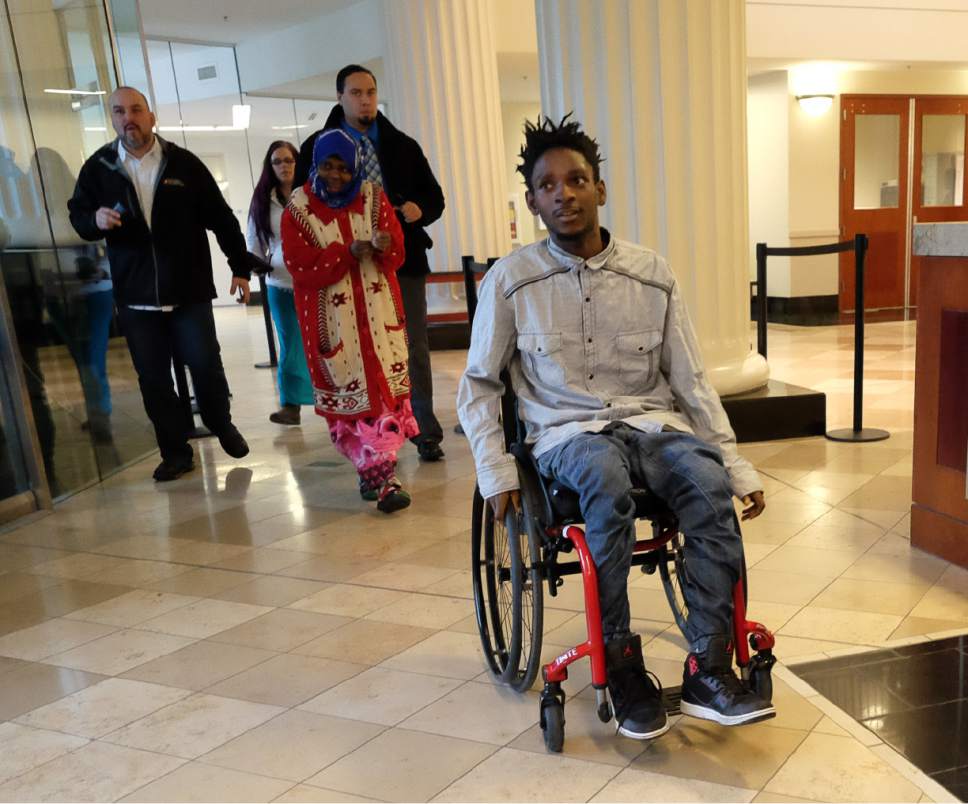This is an archived article that was published on sltrib.com in 2017, and information in the article may be outdated. It is provided only for personal research purposes and may not be reprinted.
The criminal case filed against a Utah teen after he was shot by police near a Salt Lake City homeless shelter last year will remain in juvenile court, a judge ruled Friday.
Abdullahi "Abdi" Mohamed was 17 years old in February 2016, when he was shot while allegedly assaulting a man with a hollow metal rod in a dispute about a drug purchase.
In August, Salt Lake County District Attorney Sim Gill ruled that the officers were justified in shooting the now-19-year-old man. Gill charged Mohamed with first-degree felony aggravated robbery and second-degree felony drug possession with intent to distribute — a case prosecutors wanted moved to adult court.
But 3rd District Juvenile Court Judge Julie Lund — who earlier this week listened to testimony from defense witnesses who said the case should remain in the juvenile system — opted instead to keep the case in juvenile court.
"I want you to know we're giving you this chance today," the judge told Mohamed on Friday. "You need to make the most of it."
Mohamed responded quietly, "I will."
The maximum punishment that Mohamed can now face is a stay in a juvenile secure care facility until he is 21 years old. In adult court, he would have faced a maximum penalty of up to life in prison if convicted of the first-degree felony charge.
Mohamed will be back in Lund's courtroom May 17 for his next hearing.
Defense attorney Sam Pappas praised the judge's decision after Friday's hearing.
"It's the best option, not only for him," Pappas told the news media. "It's the best option for everyone, the best option for the community. I'm pleased that the Legislature has adjusted the statute so that we don't continue to make the mistakes of trying juveniles as adults that we've made for a generation."
Pappas was referencing an amendment to Utah's Serious Youth Offender Act made in 2013, giving judges the discretion to decide whether a case should stay in juvenile court. Previously, juveniles were routinely sent to the adult system if they committed a serious offense and met other factors.
Gill said Friday that prosecutors will move forward with the case in the juvenile system and noted a plea deal in the case is always a possibility.
"This is exactly how our process is supposed to work," he said.
Pappas argued Friday that Mohamed's case should remain in juvenile court so he could receive better services and counseling. Moving cases to the adult system should be saved only for "the worst of the worst," he said.
"This is not that type of offense," he argued.
The defense attorney also argued that because of injuries suffered when shot by police, Mohamed — who currently uses a wheelchair — is not a threat to public safety. He also argued that while Mohamed has a lengthy history in the juvenile court, most of the crimes were not serious.
Deputy Salt Lake County District Attorney Michael Colby countered that Mohamed has had the opportunity to receive assistance from Juvenile Justice Services and has continued to commit crimes.
"The court needs to try something new," Colby argued, "and that is to send this case to the adult court."
Colby also argued that Mohamed is currently a legal adult who now has pending cases in the adult court system. Since the beginning of this year, Mohamed has been charged in the Salt Lake City Justice Court with consuming alcohol as a minor, criminal mischief, domestic violence, along with infractions for public urination and drinking alcohol in a park.
Jackie Chamberlain, the public information officer for the Division of Juvenile Justice Services, said in a statement Friday that JJS "is committed to providing wrap-around services and continued evidence-based programming to address [Mohamed's] needs and risk level that we believe will allow him the best opportunity to succeed."
The juvenile court case arose from events on Feb. 27, 2016, when Mohamed allegedly assaulted a man who had asked to buy a marijuana cigarette from him for $1.10 near the Road Home shelter, 210 S. Rio Grande St. (440 West). Two police officers were in the area, according to preliminary hearing testimony, and spotted Mohamed striking the man with a hollow metal rod, which has been described as a handle for a mop, rake or broom.
As officers ran toward the scene and yelled at Mohamed to drop the weapon, they both opened fire. The teen was struck by four bullets and was in a medically induced coma, hospitalized for weeks.
While Gill declared that the officers were justified in firing their weapons, Salt Lake City's Civilian Review Board found that the actions of two officers were "not within" policy, according to the board's report.
The Salt Lake Tribune does not generally identify juveniles charged with a crime, but Mohamed's family publicly identified him in the wake of the police shooting.









